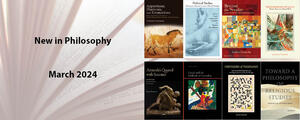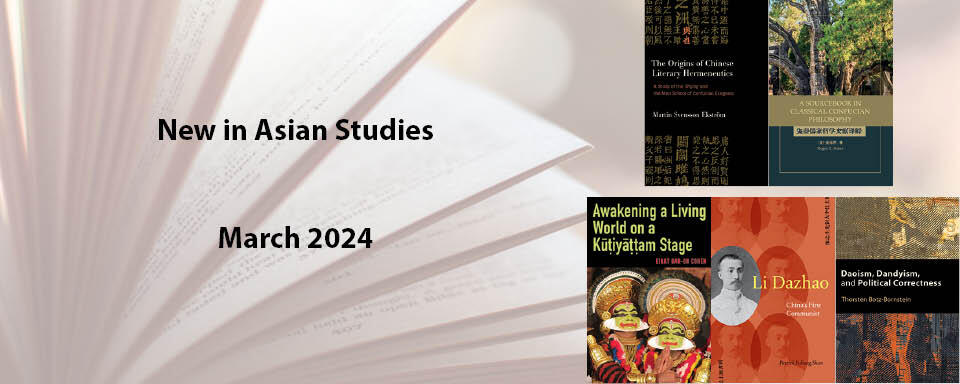
New This Month in Asian Studies
We have three new books in Asian Studies for March. Delve into Sanskrit theater culture, China's shift from empire to republic, or the interpretation of China's oldest poetry collection. Additionally, this month's new in paper titles discuss classical Confucian philosophy and the relationship between Daoism and dandyism.
Awakening a Living World on a Kūṭiyāṭṭam Stage, by Einat Bar-On Cohen, explores the cultural dynamics of this ancient form of Sanskrit theater, and is the latest in our series in Hindu Studies.
"This book offers a fresh perspective on Kūṭiyāṭṭam, seeking answers to questions of freedom and restraint, reality and role-playing, play and ritual in this theatrical form. Engaging with a wide range of actors, spectators, and members of family lineages, Einat Bar-On Cohen offers a thorough investigation and analysis of different scenes and episodes in Kūṭiyāṭṭam, bringing out their expressive power and dramatic significance." — Sudha Gopalakrishnan, author of Kutiyattam: The Heritage Theatre of India
Our series in Chinese Philosophy and Culture brings two new books this month. First, Li Dazhao: China's First Communist, by Patrick Fuliang Shan, a biography of a major figure in modern Chinese history. As one of the founders of the Chinese Communist Party, Li Dazhao (1889–1927) was a key figure in China's transition from empire to republic, from tradition to modernity, and from imperial rule to turbulent revolution.
"This book makes a huge contribution to the study of the early history of the Chinese Communist movement and the field of modern Chinese history in general, by chronicling in great detail the life of Li Dazhao as an intellectual, a professional revolutionary, and a cofounder of the Chinese Communist Party (CCP). English-language scholarship on Li Dazhao has been very limited, and this book will be indispensable reading for anyone who is seriously interested in the early history of the CCP and the origins of both the National Revolution and the Communist Revolution. This book will be indispensable reading for anyone who is seriously interested in the early history of the CCP and the origins of both the National Revolution and the Communist Revolution." — Huaiyin Li, author of The Making of the Modern Chinese State, 1600–1950
Second, The Origins of Chinese Literary Hermeneutics: A Study of the Shijing and the Mao School of Confucian Exegesis, by Martin Svensson Ekström, explores how China’s oldest poetry collection was interpreted in a Confucian exegetical text—the Mao Commentary—in the mid-second century BCE.
"Svensson Ekström's work moves Shijing scholarship and exegesis to a whole new level, transcending as it does the simplistic dichotomous approach to Western–Chinese studies that has trapped people on both sides of this false divide for far too long. This is close reading scholarship at its best, for it allows ancient Chinese texts to speak for themselves, free of the distortions generated by false cultural assumptions underlying much of scholarship on such subjects in both China and the West." — Richard John Lynn, University of Toronto
Also in the Chinese Philosophy and Culture series and new in paper is A Sourcebook in Classical Confucian Philosophy, by Roger T. Ames, (a companion volume to A Conceptual Lexicon for Classical Confucian Philosophy). Ames applies a method of comparative cultural hermeneutics to let the tradition speak on its own terms.
New in paper in our Translating China series is Daoism, Dandyism, and Political Correctness, by Thorsten Botz-Bornstein, arguing that Daoism and dandyism, linked by likeminded philosophies of “carefree wandering,” deconstruct the puritanism and political correctness sought by Confucianism, Victorianism, and contemporary neoliberal culture.
"Intriguing, thought-provoking, and engaging, this book conducts a philosophical analysis of a sensitive political issue. It not only promotes a textual study of Daoist philosophy, but, more importantly, shows how Daoist philosophy can be relevant to understanding the vast 'language correction project' of the present moment. The intellectual courage and philosophical diversity are inspired and embodied." — Robin R. Wang, author of Yinyang: The Way of Heaven and Earth in Chinese Thought and Culture
Happy reading and come back to see what's new next month!
Books Mentioned In This Post
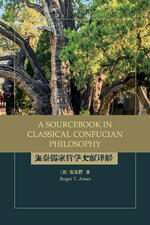
A Sourcebook in Classical Confucian Philosophy
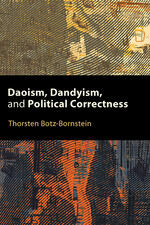
Daoism, Dandyism, and Political Correctness
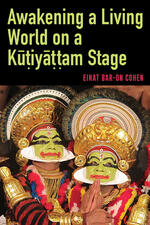
Awakening a Living World on a Kūṭiyāṭṭam Stage
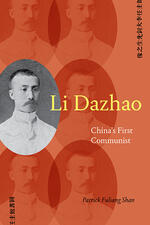
Li Dazhao
China's First Communist
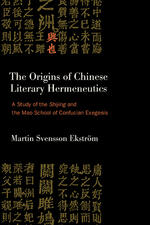
The Origins of Chinese Literary Hermeneutics
A Study of the Shijing and the Mao School of Confucian Exegesis
